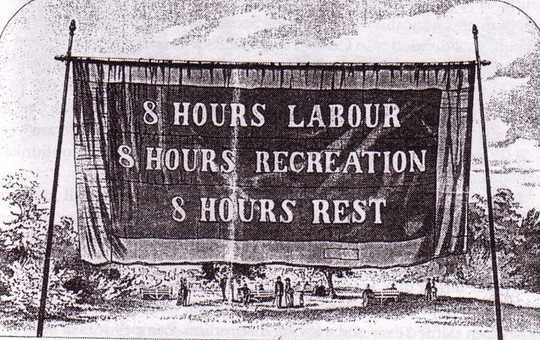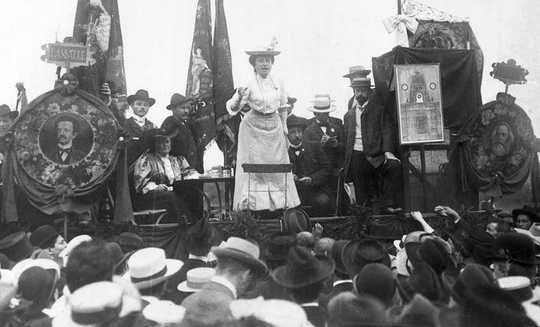
A decade ago, most people interested in politics associated the words social democracy with business-friendly governments, lower taxes, economic growth, high wages and low unemployment. Social democracy seemed to be the guardian of a new Gilded Age. It meant good times, a positive Third Way between capitalism and socialism. It represented a progressive vision of market reforms, new public management and rising consumption, a shift from savings capitalism to a capitalism of easy lending, the triumph of a new era of ‘privatised Keynesianism’ led by the governments of David Lange, Bill Clinton, Tony Blair and Gerhard Schröder.
The reputation of social democracy has since been damaged. The phrase nowadays connotes things much less positive: career politicians, scripted speeches, intellectual emptiness, declining party membership, discredited defenders of 'too big to fail’ banks and austerity like Felipe González and François Hollande. And crushing electoral defeat, of the kind recently suffered (at the hands of the far-right populist Norbert Hofer) in the first round of presidential elections by the Austrian Social Democratic Party, whose ancestor (SDAPÖ) was once among the most powerful, dynamic and forward-thinking party machines of the modern world.
Things were not always so grim for social democracy. In Europe, North America and the Asia Pacific region, social democracy was once defined by its distinctively radical commitment to reducing social inequality caused by market failures. Especially in the decades before and after World War One, it stood proudly for the political enfranchisement of citizens, minimum wages, unemployment insurance and curbing the extremes of wealth and indigence. It battled to empower middle-class and poor citizens with better education and health care, subsidised public transportation and affordable public pensions. Social democracy stood for what Claus Offe famously called de-commodification: breaking the grip of money, commodities and capitalist markets on citizens’ lives, to enable them to live more freely and equally in a decent and just society.
In most countries of the world, the fortunes of social democracy have since slipped or disappeared, well beyond the political horizons of the present. Yes, generalisations are risky; the troubles of social democracy are spread unevenly. There are still honest politicians who call themselves social democrats and stand for the old principles. And there are instances where social democratic parties hang on and hang around by joining grand coalitions: the few cases include the Große Koalition in Germany and the ‘red-green’ government led by Stefan Löfven in Sweden. Elsewhere, especially in countries now suffering the chill winds of austerity and economic stagnation and disaffection with cartel parties, social democrats look so lost and tired and broke that they are even forced to sell off or down-size their headquarters, which was the fate that befell the [Social Democratic Party of Japan](https://en.wikipedia.org/wiki/Social_Democratic_Party_(Japan) in 2013.
Market Failures
Such differences of fate among social democratic parties need to be noted; but they shouldn’t divert our attention from the basic historical fact that social democracy everywhere is a dying force. For much of its history, it stood firmly against the blind acceptance of market forces and their destructive impact upon people’s lives. Social democracy was a rebel child of modern capitalism. Born during the 1840s, when the neologism Sozialdemokratie first circulated among disaffected German-speaking craftsmen and workers, social democracy fed vigorously, like an evolutionary mutation, on the body of dynamic markets. It hitched its fortunes to commercial and industrial expansion, which in turn produced skilled tradesmen, farm and factory workers, whose angry but hopeful sympathy for social democracy made possible the conversion of isolated pockets of social resistance into powerful mass movements protected by trade unions, political parties and governments committed to widening the franchise and building welfare state institutions.
Market failures deepened resentments among social democrats. They were sure that unbridled markets do not naturally lead to a happy world of Pareto efficiency, where everybody benefits from efficiency gains engineered by capitalists. Their most powerful charge was that free market competition produces chronic gaps between winners and losers and, eventually, a society defined by private splendour and public squalor. If Eduard Bernstein, Hjalmar Branting, Clement Attlee, Jawaharlal Nehru, Ben Chifley and other social democrats from last century were suddenly to reappear in our midst, they would not be surprised by the way practically all market-driven democracies are coming to resemble hour glass-shaped societies, in which the wealth of small numbers of extremely rich people has multiplied, the shrinking middle classes feel insecure and the ranks of the permanently poor and the precariat are swelling.
Consider the case of the United States, the richest capitalist market economy on the face of the earth: 1% of its households own 38% of the national wealth, while the bottom 80% of households own only 17% of national wealth. Or France, where (according to Pierre Rosanvallon’s The Society of Equals) the average disposable income (after transfers and taxes) of the wealthiest 0.01 percent of the population now stands at seventy-five times that of the bottom 90 percent. Or Britain, where at the end of three decades of deregulated growth, 30 per cent of children live in poverty and a majority of middle class citizens reckon themselves vulnerable to unemployment, and to the humiliation joblessness brings. Or Australia, where the level of income inequality is now above the OECD average, the top 10% of wealth holders own 45% of all wealth and the top 20% wealth group has 70 times more wealth than a person from the bottom 20%.
 Eight-hour day banner, Melbourne, 1856.
Eight-hour day banner, Melbourne, 1856.
Social democrats not only found obnoxious, and actively resisted, social inequality on this scale. They railed against the general dehumanising effects of treating people as commodities. Social democrats acknowledged the ingenuity and productive dynamism of markets. But they were sure that love and friendship, family life, public debate, conversation and the vote could not be bought with money, or somehow be manufactured by commodity production, exchange and consumption alone. That was the whole point of their radical demand for Eight Hours Work, Eight Hours Recreation and Eight Hours Rest. Unless checked, the free-market propensity to ‘truck, barter and exchange one thing for another’ (Adam Smith’s words) destroys freedom, equality and social solidarity, they insisted. To reduce people to mere factors of production is to risk their death by market exposure. In the dark year of 1944, the Hungarian social democrat Karl Polanyi put the point in defiant words: ‘To allow the market mechanism to be the sole director of the fate of human beings and their natural environment’, he wrote, ‘would result in the demolition of society’. His reasoning was that human beings are ‘fictitious commodities’. His conclusion: ‘"labour power" cannot be shoved about, used indiscriminately, or even left unused’.
The insistence that human beings are neither born nor bred as commodities proved to be far-reaching. It explains the conviction of Polanyi and other social democrats that decency would never spring automatically from capitalism, understood as a system that turns nature, people and things into commodities, exchanged through money. Dignity had to be fought for politically, above all by weakening market forces and strengthening the hand of the commonweal against private profits, money and selfishness.
But more than a few social democrats went further. Chastened by the long depression that broke out during the 1870s, then by the catastrophes of the 1930s, they pointed out that unfettered markets are disastrously prone to collapse. Economists of recent decades have regularly described these failures as ‘externalities’ but their jargon is misleading, or so many social democrats once insisted. It is not just that firms produce unintended effects, ‘public bads’ like species destruction and car-choked cities, that do not figure in corporate balance sheets. Something more fundamental is at stake. Free markets periodically cripple themselves, sometimes to the point of total breakdown, for instance because they whip up socially destructive storms of technical innovation (Joseph Schumpeter’s point) or because, as we know from recent bitter experience, unregulated markets generate bubbles whose inevitable bursting bring whole economies suddenly to their knees.
What Was Socialism?
There was always muddle over the meaning of the ‘social’ in social democracy; and there were frequent brawls about whether and how the taming of markets, which many called ‘socialism’, could be achieved. The great moments of high drama, strife and luscious irony need not detain us here. They form part of a recorded history that includes the courageous struggles of the downtrodden to form co-operatives, friendly societies, free trade unions, social democratic parties and the fractious splits that gave birth to anarchism and Bolshevism. The history of social democracy includes outbursts of nationalism and xenophobia and (in Sweden) experiments with eugenics. It also includes the re-launch of social democratic parties at the Frankfurt Declaration of the Socialist International (1951), efforts to nationalise railways and heavy industry, and to socialise the provision of health care and formal education for all citizens. The history of social democracy also embraces big and bold thinking, romantic talk of the need to abolish alienation, to respect what Paul Lafargue called the right to be lazy, and the vision projected by his father-in-law Karl Marx of a post-capitalist society, in which women and men, freed from the shackles of the market, went hunting in the morning, fished in the afternoon and, after a good dinner, engaged others in frank political discussion.
A strange feature of the history of social democracy is just how distant and detached these details now feel. Its parties have run out of steam; their loss of organising energy and political vision is palpable. Collaborators with finance capitalism then apologists of austerity, their Third Way has turned out to be a dead end. Gone are the flags, historic speeches and bouquets of red roses. Party leader intellectuals of the calibre of Eduard Bernstein (1850 – 1932), Rosa Luxemburg (1871 -1919), Karl Renner (1870 - 1950) and Rudolf Hilferding (1877 - 1941) and C.A.R. Crosland (1918 - 1977) are a thing of the past. Today’s party leaders who still dare to call themselves social democrats are by comparison intellectual pygmies. Loud calls for greater equality, social justice and public service have faded, into a choking silence. Positive references to the Keynesian welfare state have disappeared. As if to prove that social democracy was just a brief interlude between capitalism and more capitalism, there is much talk of ‘renewed growth’ and ‘competition’, public-private partnerships, ‘stakeholders’ and ‘business partners’. Within the dwindling ranks of committed social democrats, few now call themselves socialists (Bernie Sanders and Jeremy Corbyn are exceptions), or even social democrats. Most are party faithful, machine operators surrounded by media advisers, connoisseurs of governmental power geared to free markets. Few make noise about tax avoidance by big business and the rich, the decay of public services or the weakening of trade unions. All of them, usually without knowing it, are blind apologists of the drift towards a new form of finance capitalism protected by what I have elsewhere called ‘post-democratic banking states’ that have lost control over money supply (in countries such as Britain and Australia, for instance, over 95% of the ’broad money’ supply is now in the hands of private banks and credit institutions).
 Rosa Luxemburg (centre) addressing a meeting of the Second International, Stuttgart, 1907.
Rosa Luxemburg (centre) addressing a meeting of the Second International, Stuttgart, 1907.
The Parliamentary Road
The whole trend prompts two fundamental questions: Why did it happen? Was it necessary? The answers are naturally complicated. The trend was overdetermined by multiple intersecting forces, yet one thing is clear: social democracy did not lose ground to market economics simply because of opportunism, the decline of the labour movement or the lack of political fortitude. There was more than enough gutlessness, certainly. But social democrats were democrats. In choosing to tramp the parliamentary road, they understandably cut a path between two devilish options: communism and anarcho-syndicalism. Social democrats foresaw that the 19th-century utopia of abolishing markets would prove disastrous, either because it required full state takeover of economic life (that was von Hayek’s prediction in The Road to Serfdom [1944]) or because it supposed, in equally fanciful terms, that a united working class was capable of replacing states and markets with social harmony through autogestion.
Refusing these unpalatable options implied the duty to reconcile parliamentary democracy and capitalism. Australia’s Chilean-born John Christian Watson formed the first-ever national social democratic government in the world, from which time (1904) social democrats quickly learned that trade unions are not the only bodies whose members go on strike. Businesses do the same thing, usually with more ruinous effects, which rebound on both government and society. Many social democrats concluded that serious meddling with market forces would result in political suicide. So they opted for pragmatism, a form of ‘socialism without doctrines’, as the French traveller and future Minister of Labour Albert Métin observed when visiting the Antipodes at the time of Federation. The favourite quip of Lionel Jospin, ‘we reject the market society’ but ‘accept the market economy’, was part of this gradualist trend. [Gerhard Schroeder](https://en.wikipedia.org/wiki/Gerhard_Schr%C3%B6der_(CDU)’s ‘the New Centre’ ran in the same direction. Others refused to beat around the bush. ‘Don’t ever put up income tax, mate’, Paul Keating told the young Tony Blair before New Labour swept to office in Britain in 1997. ‘Take it off them anyhow you please but do that and they’d rip your f***ing guts out.’
Party Machines
‘Look, mate’, Blair might have replied, ‘we should have the guts to say that free markets without active government intervention, strict regulation of the banks and progressive taxation widen the gap between rich and poor, which is something our movement always stood against.’ He didn’t, and couldn’t, partly because hard-nosed advice of the Keating kind had by then become the universal anthem of what remained of social democracy.
The Third Way anthem actually had two verses, the first for the market and the second against. I once witnessed the fabulist Tony Blair reassure a gathering of trade unionists that he was against free market forces before moving on, two hours later, after a light lunch together, to tell a group of business executives exactly the opposite. The crisis of Atlantic-region capitalism since 2008 seems to have amplified the duplicity. Many who call themselves social democrats do exactly the opposite of their forebears: they sermonise the advantages of private enterprise, preach the importance of lowering taxes and getting markets working again so that GDP flourishes and state budgets can return to surplus for the sake of AAA credit ratings and the trickle-down enrichment of citizens.
The inability or unwillingness to see beyond the politics of blind dependency upon dysfunctional markets are now a source of great crisis within the social democratic parties of Austria, Ireland, the United Kingdom and a host of other countries. The machinations of their own political machinery are not helping matters. The history of social democracy is usually told in terms of the struggle to form trade unions and political parties geared to winning office. The narrative makes sense because the decision of social democrats to enter electoral politics and to abandon the path of revolution, either through vanguard parties or syndicalist strikes, paid off as a political calculation, at least for a while.
The call by social democrats to ‘use the Parliamentary machinery that in the past has used them’ (the words of the Labour Defence Committee following the defeat of the Great Maritime Strike of 1890 in Australia) changed the course of modern history. Public life had to get used to the language of social democracy. Parliamentary government had to make way for working class parties. Thanks more often than not to social democracy, women won the right to vote; and whole capitalist economies were forced to become more civilised. Minimum wages, compulsory arbitration, government-supervised health care systems, public transport, basic state pensions and public service broadcasting: these were just some of the institutional victories won by social democracy through political imagination and tough tactics.
The progress was impressive, sometimes to the point where the absorption of social democratic demands into mainstream democratic politics gradually had the effect (it seemed) of turning every fair-minded person into a social democrat, even in America, where they are still called ‘progressives’ and ‘liberals’ and (nowadays) supporters of the ‘democratic socialism’ of Bernie Sanders. Yet the victories of social democracy had a high price, in that its preferred vehicle of change, the mass political party machine, soon fell under the spell of cliques and caucuses, backroom men, fixers and spinners. ‘Where there is organisation, there is oligarchy’ was the early verdict issued by Robert Michels when analysing trends within the German Social Democratic Party, at the time (1911) the biggest, most respected and feared social democratic party in the world. Whatever is thought of his so-called ‘iron law of oligarchy’, the formulation served to pinpoint decadent trends that now bedevil and diminish social democratic parties everywhere.
When looking with a sober eye at the way social democratic parties are today run, a visitor from another era, or another planet, might easily conclude that those who control these parties would prefer to expel most of their remaining members. The situation is worse, more tragic than Michels predicted. He feared that social democratic parties would become totalitarian proto-states within states. Today’s social democratic parties are nothing like that. Oligarchies they are, but oligarchies with a difference. Not only have they lost public support. They have become objects of widespread public suspicion or outright contempt.
Membership of these parties has dipped dramatically. Accurate figures are hard to obtain. Social democratic parties are notoriously secretive about their active membership lists. We do know that in 1950, the Norwegian Labour Party, one of the most successful in the world, had over 200,000 paid-up members; and that today its membership is barely one-quarter that figure. Much the same trend is evident within the British Labour Party, whose membership peaked in the early 1950s at over 1 million and is today less than half that figure. Helped by the recent £3 special offer registration, total membership of the Labour party is now around 370,000 – less than the 400,000 figure recorded at the 1997 general election. During Blair’s years of leadership alone, membership declined steadily every year from 405,000 to 166,000.
When it is considered that during the post-1945 period, the size of the electorate in most countries has been steadily increasing (by 20% between 1964 and 2005 in Britain alone) the proportion of people who are no longer members of social democratic parties is far more substantial than even the raw numbers suggest. The figures imply a profound waning of enthusiasm for social democracy in party form. Satirists might even say that its parties are waging a new political struggle: the struggle for self-effacement. Australia is no exception; in global terms, the degenerative disease afflicting its social democracy establishment is actually trend-setting. Since the DLP split in 1954/55, active national membership has fallen by half, despite the near-tripling of the population, as Cathy Alexander has pointed out. In spite of the decision (in mid-2013) to allow rank-and-file members to cast a vote for the party’s federal leader, membership (if its own figures are to be believed) is still at or below what it was in the early 1990s. Civil society organisations such as the RSL, Collingwood AFL Club and Scouts Australia all have far bigger membership than the Labor Party.
The figures are everywhere markers of decline. Meanwhile, inside social democratic parties around the world, enthusiasms that fed battles for the universal franchise have long ago waned. The advance of multi-media communications meanwhile has made it easier for the party to collar voters opportunistically, especially during elections. Funding methods have changed as well. The old strategy of recruiting members and extracting small donations from supporters has long been abandoned. Where it exists, state funding for electoral victory (in Australia candidates who receive more than 4 per cent of primary votes receive $2.48 a vote) is like free grog at a public festival, available on tap. When social democrats find themselves in office, generous parliamentary expenses and discretionary government funds go some way to plugging the remaining gaps, especially when targeted at marginal seats. Then there is a simpler, if less refined option: charging private lobbyists ‘access fees’ (Bob Carr’s going rate was said to be $100,000) and soliciting large donations from corporations and ‘dirty money’ from wealthy individuals.
The time has long passed when social democratic parties ran on the juices of trade unionists and individual citizens volunteering to display election posters. Signing party-sponsored petitions now seems so twentieth-century. Equally passé is the hand delivery of party leaflets during an election, attendance at huge party rallies and canvassing voters on the doorstep. The age of state funding and big money has arrived. So has the age of petty corruption. Dominated by small oligarchies, social democratic parties, in the United States as much as in France, New Zealand and Spain, specialise in machine politics and its corrupting effects: nepotism, cunning plots, branch stacking, factional appointments, think tanks that no longer think outside the party box, perks for donors and party staffers.
The New Tree Green
It is sometimes said that the membership pools of social democratic parties are evaporating because the political marketplace grows ever more competitive. The political science blarney ignores the trends described above. It also hides a pertinent fact about which social democrats have long been silent: that we have entered an age of gradually rising public awareness of the destructive effects of the modern human will to dominate our biosphere, to treat nature, just as Africans or indigenous peoples were treated previously, as commodified objects fit only for shackling and muzzling for money, profit and other selfishly human ends.
For more than half a generation, beginning with works such as Rachel Carson’s Silent Spring (1962), green thinkers, scientists, journalists, politicians and social movement activists have been pointing out that the whole social democratic tradition, no matter what its current representatives say to the contrary, is implicated deeply in the thoroughly modern acts of wanton vandalism that are now rebounding on our planet.
Social democracy was the Janus face of free-market capitalism: both stood for the human domination of nature. Whether social democracy can recover politically by morphing into something it was never designed to be is unclear. Only the historians of the future will know the answer. What is certain, for the moment, is that green politics everywhere, in all its kaleidoscopic forms, pose a fundamental challenge to both the style and substance of social democracy, or what remains of it.
Armed with fresh political imagination, defenders of the biosphere have managed to craft new ways of shaming and chastening arrogant power elites. Some activists, a dwindling minority, mistakenly think that the priority is to live simply, in harmony with nature, or to return to the face-to-face ways of Greek assembly democracy. Most champions of bio-politics have a much richer sense of the complexity of things. They favour extra-parliamentary action and monitory democracy against the old model of electoral democracy in territorial state form. The invention of citizen science networks, bio-regional assemblies, green political parties (the first in the world was the United Tasmania Group), earth watch summits and the skilful staging of non-violent media events are just some of the rich repertoire of new tactics being practised in a variety of local and cross-border settings.
Historically speaking, the earthy cosmopolitanism of green politics, its deep sensitivity to the long-distance interdependence of peoples and their ecosystems, is without precedent. Its rejection of fossil-fuelled growth and habitat destruction is unconditional. It is acutely aware of the relentless upswing in the application of markets to the most intimate areas of everyday life, such as fertility outsourcing, data harvesting, nanotechnologies, and stem cell research. It understands the golden rule that whoever has the gold rules; and it is therefore sure that more and more market control of daily life, civil society and political institutions is bound to have negative consequences, unless checked by open debate, political resistance, public regulation and the positive redistribution of wealth.
Especially striking is the green call for the ‘de-commodification’ of the biosphere, in effect, the replacement of social democracy’s will to dominate nature and its innocent attachment to History with a more prudent sense of deep time that highlights the fragile complexity of the biosphere and its multiple rhythms. The new champions of bio-politics are not necessarily fatalists, or tragedians, but they are united in their opposition to the old metaphysics of modern economic progress. Some greens demand a halt to consumer-driven ‘growth’. Others call for green investments to trigger a new phase of post-carbon expansion. Almost all greens reject the old social democratic macho imagery of warrior male bodies gathered at the gates of pits, docks and factories, singing hymns to industrial progress, under smoke-stained skies. Greens find such images worse than antiquated. They interpret them as bad moons, as warnings that unless we human beings change our ways with the world in which we dwell things may turn out badly – very badly indeed. They share the sobering conclusion of Elizabeth Kolbert’s Sixth Extinction : whether we know it or not, we humans are now deciding which evolutionary pathway awaits us, including the possibility that we are trapped in an extinction event of our own making.
 Elizabeth Kolbert. Barry Goldstein
Elizabeth Kolbert. Barry Goldstein
Under Another Name
It is worth asking whether these combined novelties are evidence of a black swan moment in human affairs. Is the upsurge of protest against environmental destruction at various points on our planet proof that we are living through a rare period of rupture? A transformation analogous to the early decades of the nineteenth century, when the rough-and-tumble resistance to market-driven industrial capitalism slowly but surely morphed into a highly disciplined workers’ movement receptive to the siren calls of social democracy?
It is impossible to know with utter certainty whether our times are like that, although it should be noted that many green analysts of social democracy are convinced that a tipping point has indeed been reached. Several years ago, for instance, the best-selling It’s The End of the World As We Once Knew It, by Claus Leggewie and Harald Welzer, caused a rumpus in Germany by indicting ‘oiloholic societies’ for their ‘culture of waste’ and ‘civil religion of growth’. The book condemns Realpolitik as a ‘complete illusion’. Chinese-style ‘sustainable’ growth and other forms of state-imposed ecology are deemed dangerous, because undemocratic. What is needed, the authors say, is extra-parliamentary opposition that initially targets the ‘mental infrastructures’ of citizens. Similar sentiments, minus inspiration from [R.E.M.](https://en.wikipedia.org/wiki/It%27s_the_End_of_the_World_as_We_Know_It_(And_I_Feel_Fine), are echoed locally by Clive Hamilton. Social democracy ‘has served its historical purpose’, he writes, ‘and will wither and die as the progressive force’ in modern politics. What is now needed is a new ‘politics of wellbeing’ based on the principle that ‘when the values of the market intrude into areas of life where they do not belong’ then ‘measures to exclude them’ need to be taken.
The analyses are searching, thoughtful but at times too moralising. Their understanding of how to build a new politics of de-commodification geared to seducing, threatening, legally forcing businesses to honour their social and environmental duties, this time on a global scale, is often poor. These green perspectives nevertheless pose questions that are fundamental for the future of monitory democracy. They certainly put pressure on those who still think of themselves as social democrats to come clean on many questions to do with money and markets. In effect, the new green politics insists that the point is not only to change the world, but also to interpret it in new ways. The new politics pointedly asks whether the rudderless ship of social democracy can survive the rough seas of our age.
Champions of the new bio-politics throw down sharp-edged gauntlets: what is the social democratic formula for handling Japanese-style stagnation, they ask? Why are social democratic parties still attached to state budget cutting within hourglass-shaped societies marked by widening gaps between rich and poor? Why have social democrats failed to understand that low revenues, not high spending are the chief source of government debts? What is their recipe for dealing with public disgruntlement with political parties and the rising perception that carbon-driven, credit-fuelled mass consumption has become unsustainable on planet Earth? Supposing that the power-chastening spirit of democracy cannot be confined to territorial states, how can democratic mechanisms of public accountability and the public restraint of arbitrary power best be nurtured at the regional and global levels?
Many thinking social democrats reply by emphasising the flexibility of their creed, the capacity of their originally 19th-century standpoint to adapt to 21st-century circumstances. They are adamant that it is much too early to bid farewell to social democracy; they reject the charge that it is a worn-out ideology whose moments of triumph belong to the past. These social democrats admit that the goal of building social solidarity among citizens through state action has been damaged by the fetish of free markets and fudged agendas designed to win votes from business, the rich and right-wing competitors. They sense the exhaustion of the old slogan Eight Hours Work, Eight Hours Recreation, Eight Hours Rest. They recognise that the spirit of social democracy was once infused with the vibrant vocabulary of other moral traditions, such as the Christian distaste for materialism and extremes of wealth. They admit to being impressed by the media-savvy initiatives of civic networks such as Greenpeace, M-15, Amnesty International and the International Consortium of Investigative Journalists, whose actions aim to put a stop to the violence of states, armies and gangs, but also to corporate misconduct and market injustices in cross-border settings.
These thinking social democrats ask questions about how and where 21st-century defenders of social democracy can turn for fresh moral guidance. Their answers are various, and do not always produce agreement. Many join Michael Walzer and others in reiterating the importance of ‘equality’ or ‘complex equality’ as the core value of their creed. Other social democrats, the distinguished historian Jürgen Kocka among them, engage in what scholars have called Rettendekritik: they look backwards, to learn from the past, to retrieve its ‘wish images’ (Wunschbilder) to gain inspiration for dealing politically with the new problems of the present. They are sure that the old topic of capitalism and democracy deserves to be revived. Kocka warns that contemporary ‘financialised’ capitalism is ‘becoming more and more market radical, more mobile, unsteady and breathless’. His conclusion is striking: ‘capitalism is not democratic and democracy not capitalistic’.
Not all of these thinking social democrats are sympathetic to the greening of politics. In the German capitalism and democracy debate, for instance, Wolfgang Merkel is among those who who are insisting that 'post-material progressivism’ centred on issues such as ‘gender equality, ecology, minority and gay rights’ have lulled social democrats into complacency about questions of class. Other social democrats see things differently. Their rethinking of the parameters of traditional social democracy leads them leftwards, towards the realisation that green movements, intellectuals and parties are potentially poised to wage the same struggle against market fundamentalism that social democracy began over a century and a half ago.
How viable is their hope that red and green can be mixed? Presuming that red-green co-operation is possible, can the result be more than bland shades of neutral brown? Might the old and new be combined into a powerful force for democratic equality against the power of money and markets run by the rich and powerful? Time will tell whether the proposed metamorphosis can happen successfully. As things stand, only one thing can safely be said. If the red-to-green metamorphosis happened then it would confirm an an old political axiom famously outlined by William Morris (1834 - 1896): when people fight for just causes, the battles and wars they lose sometimes inspire others to carry on their fight, this time with new and improved means, under an entirely different name, in much-changed circumstances.![]()
About The Author
John Keane, Professor of Politics, University of Sydney. Sponsored by the John Cain Foundation
This article is republished from The Conversation under a Creative Commons license. Read the original article.
Related Books
at InnerSelf Market and Amazon
























